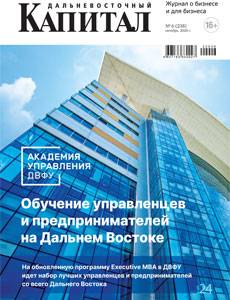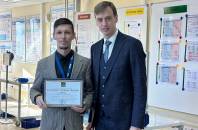|
Региональный журнал для деловых кругов Дальнего Востока
|
|
||||||||||||||||||||||
|
Вторник| 18 Ноября, 02:52 |
|
|
Тема номера
|
|||||||||||||||||||||

 Олег Кожемяко осуществил новогодние желания маленьких приморцев
В преддверии новогодних праздников заветные желания маленьких приморцев начинают сбываться. Так, Губернатор Приморского края Олег Кожемяко передал подарки от Деда Мороза двум маленьким приморцам: шестилетнему Мирону Глушаку из Тернейского муниципального округа и четырёхлетней Ольге Алимпиевой из Арсеньева.
Олег Кожемяко осуществил новогодние желания маленьких приморцев
В преддверии новогодних праздников заветные желания маленьких приморцев начинают сбываться. Так, Губернатор Приморского края Олег Кожемяко передал подарки от Деда Мороза двум маленьким приморцам: шестилетнему Мирону Глушаку из Тернейского муниципального округа и четырёхлетней Ольге Алимпиевой из Арсеньева.
 Родители ребят с ОВЗ обсудили вопросы образования и трудоустройства с представителями власти Приморья
Третья встреча клуба "На равных", призванного помогать гражданам решить непростые жизненные ситуации, состоялась в Приморье. В этот день участниками клуба стали родители детей с инвалидностью и ограниченными возможностями здоровья. Они обсудили с представителями власти вопросы образования и трудоустройства таких ребят.
Родители ребят с ОВЗ обсудили вопросы образования и трудоустройства с представителями власти Приморья
Третья встреча клуба "На равных", призванного помогать гражданам решить непростые жизненные ситуации, состоялась в Приморье. В этот день участниками клуба стали родители детей с инвалидностью и ограниченными возможностями здоровья. Они обсудили с представителями власти вопросы образования и трудоустройства таких ребят.
 Социальные предприниматели Приморья могут найти кадры и получить рекламу на радио при господдержке
Открыт прием заявок на две актуальные для социальных предпринимателей меры поддержки: "Размещение двух вакансий на HeadHunter" и "Размещение рекламы на радиостанции". Такой формат господдержки поможет социальному бизнесу Приморья продвигать свои услуги в осенний период и найти профессиональные кадры для расширения штата.
Социальные предприниматели Приморья могут найти кадры и получить рекламу на радио при господдержке
Открыт прием заявок на две актуальные для социальных предпринимателей меры поддержки: "Размещение двух вакансий на HeadHunter" и "Размещение рекламы на радиостанции". Такой формат господдержки поможет социальному бизнесу Приморья продвигать свои услуги в осенний период и найти профессиональные кадры для расширения штата.
 24 протокола составили на нарушителей противопожарного режима в приморских лесах
Лесничие и инспекторы в Приморье составили 24 протокола в отношении нарушителей особого противопожарного режима на землях лесного фонда. ОПР действует в большинстве муниципалитетов и подразумевает крупные штрафы за пренебрежение правилами пожарной безопасности.
24 протокола составили на нарушителей противопожарного режима в приморских лесах
Лесничие и инспекторы в Приморье составили 24 протокола в отношении нарушителей особого противопожарного режима на землях лесного фонда. ОПР действует в большинстве муниципалитетов и подразумевает крупные штрафы за пренебрежение правилами пожарной безопасности.
AGENDA OF THE APEC CEO SUMMIT 2012
What gains do countries achieve by integrating their economies? Does economic integration contribute to sustainable economic growth? Are there limits to productive integration? Economic integration can benefit those who participate by increasing the volume of international trade and the amount of foreign direct investment. International trade theory postulates that integration is value-enhancing, allowing countries to specialise in the products and services where they have the strongest competitive advantage. However, as the current European experience demonstrates all too vividly, there are significant risks associated with the institutional imperfections of advanced economic integration. In addition, it must be noted that the theory is silent on how the benefits of economic integration are to be split between countries, or even within countries. Indeed, the ‘optimum’ scale and path of such integration is, in many cases, subject to significant debate.
Scott Price, President and CEO, Walmart Asia, session speaker “Economic integration: benefits and unintended consequences”:
“APEC 2012 is truly a milestone opportunity for APEC constituents. It brings the heads of state and key ministers from APEC countries, corporate leaders, media and other policy influencers to the same table to discuss solutions to some of the world’s most pressing challenging issues - economic growth, sustainability, the continued efforts against hunger and the economic empowerment of women. APEC also continues the focus on delivering free and open trade and investment in the APEC region, something that is critically important in a highly competitive economic environment.
Over the last few years APEC has really evolved to be a forum where the constituents are engaging with a spirit of openness, thinking beyond borders on pressing economic, regulatory and social issues. There is a high level of transparency and openness in the discussions. The combination of political and corporate leadership present at the APEC CEO summit is quiet unique. Government and private sector partnership are helping shape sustainable answers to many of the world’s problems.
This is a challenging time. We have seen that over the last couple of years, economic recession has been a constant backdrop that threatened to bring about some protectionist tendencies. Importantly, better sense has prevailed so far by and large. That said, challenging economic times always make it difficult to advance free trade talks. It will be important to see progress on the TPP (Trans Pacific Partnership). That will be the real big question at Vladivostok.
This forum provides Companies a secure, transparent environment in which to interact with some of the leading policy makers on global issues. It is a unique forum where Government, Corporate leaders, the news media and educators come together to talk about issues APEC constituents face, free trade between these constituents and overall solutions.
I am hopeful that APEC 2012 will build on the progress of recent years and continue down the path of leveraging this excellent partnership between Government and the private sector in offering our customers, consumers and communities a better life”.
Discussion participants: John Key, Prime Minister of New Zealand; John Faraci, Chairman and CEO, International Paper; Luis Alberto Moreno, President, Inter-American Development Bank; Dennis Nally, Chairman, PwC International; Victor Vekselberg, President, Skolkovo Foundation, etc.
Panel discussion “Energy: sustainable and economical”
Moderator: Vijay Vaitheeswaran, China’s Business Editor, The Economist
This discussion will touch upon limited energy resources, improving energy efficiency and developing new sources of energy that will provide for sustainable momentum. The stable provision of energyaims to meet the needs of the present without compromising the ability of future generations to meet their needs. Can innovation provide society with new, efficient and safe sources of energy? Technologies that promote sustainable energy include renewable energy sources, such as hydroelectricity, solar energy, wind energy, wave power, geothermal energy and tidal power. Do these technologies improve energy efficiency and benefit society by their economical advantages? The participants will also discuss the positive results of developing renewable energy sources. Renewable energy technologies generally contribute to world energy security, reducing the dependence on fossil fuels and providing opportunities for mitigating greenhouse gases.
Vijay Vaitheeswaran, China’s Business Editor, The Economist, session moderator “Energy: sustainable and economical”:
“The energy sector isn’t known for radical change. Over the last 60 years, we’ve gone to the moon, designed weapons strong enough to blow up the planet many times over and turned computers from sluggish, room-sized machines into hand-held libraries with more content than the Library of Alexandria. But the ways we generate our electricity, move our cars and heat our buildings are still fundamentally the same as they were six decades ago. But that change is truly upon us.
There are three “pillars of instability” contributing to these changes: Climate change, geopolitics and energy poverty. In our ultra-connected world, we are able to understand the link between energy use and the environment; we can see the violent and complicated problems that come with relying on politically unstable countries for our energy; and energy impoverished people now see what life can be like with access to abundant energy.
We take these together and we are building a new paradigm for clean energy. This confluence is creating trouble for the incumbents, the dinosaurs of dirty energy. But that also creates opportunities for the entrepreneurs, the nimble upstarts, those that invest in clean technologies.
So some of the existing energy companies will be nimble enough and far sighted enough to make the change.
After a while, we got very complacent. We have not fundamentally changed how cars work, the electricity paradigm is decades old and we have not done much to get beyond the limited resource of oil. So will we ever re-create the period of innovation that took place a century and a half ago? Solar companies are becoming international energy service providers; biofuel companies are bringing once cost-prohibitive algae and cellulosic fuels closer to commercialization; and small start-up companies are sneaking up on the struggling behemoth automakers, forcing them to rethink the way they manufacture and market personal transportation. I will be pleased if we have and interesting discussion”.
Discussion participants: Oleg Budargin, Chairman, FGC UES; Jiang Jiemin, Chairman, PetroChina; Sergey Kirienko, Director General, State Atomic Energy Corporation “ROSATOM”; Rex Tillerson, Chairman, Exxon Mobil, etc.
September, 7
Panel discussion “Supply chains: ever more efficient, ever more vulnerable?”
Moderator: Donald Almeida, Vice Chairman Clients
and Markets, PwC
This discussion will focus on the current trends in supply chain management that have made delivery channels more efficient, but also more vulnerable, and ask how can we improve the efficiency and reliability of supply chains. Mostly, they are just-in-time practices, cost reduction, economies of scale, outsourcing non-core activities and consolidating suppliers. However, while these practices have a lot of successful examples, there are also risks emanating from the widespread adoption of these practices. These trends can result in supply chain vulnerability by decreasing flexibility and reducing the redundancy in the supply channels of critically important goods below levels prescribed by prudent long-term risk management. Other issues include the cascading impact of disruptions, potential loss of control and geographically stretched supply lines. How can supply chains be made both more efficient and more reliable? What is the proper balance between optimising costs and ensuring that global supply chains are robust?
Donald Almeida, Vice Chairman Clients and Markets, PwC, session moderator “Supply chains: ever more efficient, ever more vulnerable?”:
“During the session titled “Supply chains: ever more efficient, ever more vulnerable,” I will focus mainly on the specific steps that could be taken to make supply chains both more efficient and more reliable. During this discussion, I will also ask for participants’ views on the proper balance between optimising costs and ensuring that global supply chains are robust. How to find this balance is a very crucial question. Making commodities less costly and enhancing the reliability of their movement along the entire logistics chain, from producer to consumer, is a key factor in international trade. This involves a number of factors, including forming economically viable and secure commodity supply chains, coordinating various modes of transport, setting up transport hubs and corridors with state-of-the-art IT and satellite navigation systems, and harmonising transportation security standards. For sure, the session will also touch upon the overall benefits that the APEC region offers.
I will be pleased if we have and interesting discussion that is also right to the point and wraps up with a consensus on some concrete steps that should be taken concerning supply chains. I fully expect that participants will share their personal views with the audience as well as their experience in APEC and vision for the region’s future. All in all, I anticipate that the panelists will touch upon a range of global issues, including how the APEC region can benefit leading global players as well as a detailed look at the main challenges now facing supply chains.
The 2012 APEC CEO Summit is definitely major event for all APEC member economies, and especially those whose main interest is in cooperation to promote economic modernisation. First of all, this involves initiating an exchange of advanced know-how on how to go about shaping a favorable institutional environment that can foster innovative development and help create region-wide mechanisms for working together in science, technology and innovation. PwC was the Knowledge Partner of the 2011 APEC CEO Summit, which took place on 10-12November in Honolulu, Hawaii. And, once again, this year we will be publishing special APEC CEO Survey report. We’re confident that this unique publication will be of great interest for all participants. In general, we’re expecting the 2012 Summit to once again provide a unique forum for all participants to meet, network and lay the groundwork for further collaboration”.
Discussion participants: Ziyavudin Magomedov, Chairman of the Board of Summa Group; Scott Price, President and CEO, Walmart Asia, etc.
Panel discussion “How many currencies does the world need?”
Moderator: David Pilling, Asia Editor, Financial Times
The increased volatility of the major currency pairs since the 2008 crisis, as well as the growing evidence that policymakers in many countries are attracted to unconventional monetary policies, raises the issue of how reliable individual fiat currencies are as a store, and measure, of value. This naturally calls for corporations, households and official reserve managers alike to diversify their currency risk. The scope, the pace and the consequences of such diversification are to be the central issues reviewed and debated at this panel.
David Pilling, Asia Editor, Financial Times, session moderator “How many currencies does the world need?”:
“Obviously, the backdrop is economic malaise and fears about prolonged recession and unemployment. In normal circumstances these are not the best conditions in which to advance free trade talks or to discuss the co-ordination of mutually beneficial policies.
The world has managed to avoid strong protectionist measures so far, but it has been slow to advance the free trade agenda on anything but a bilateral level. New rules on financial regulation have also been slow in coming. The big game in town so far as APEC is concerned is the Trans-Pacific Partnership launched at last year’s summit. Whether Japan can be a genuine part of such a high-level agreement is one of the most crucial questions. Perhaps at Vladivostok we will begin to get a sense of that.
Well, one shouldn’t hope for too much. But talking is good”.
Discussion participants: Clifford Bennett, Chief Economist, White Crane Group; Andrey Kostin, Chairman of the Management Board, VTB Bank; Jing Ulrich, Managing Director and Chairman of Global Markets - China, JPMorgan Chase, etc.
Panel discussion “Resources: what are the limits to growth?”
Moderator: Domenic Barton, Global Managing Director,
McKinsey&Company
This discussion will focus on the availability and efficient use of resources in order to ensure sustainable growth. Participants will discuss current and secular trends in the availability of energy and energy efficiency, the capacity constraints in the supply chains of metals and bulk commodities, as well as the importance of ensuring that food and water supplies are used judiciously. Special attention will be given to the dangers posed by the two extreme positions on managing natural resources: resource nationalism and the rising tide of calls questioning national sovereignty over natural resources.
Discussion participants: Michael Klare, Director of the Five College Program in Peace and World Security Studies (PAWSS); Peter Voser, CEO, Shell, etc.
Session “Distant provinces - the scale of opportunity”
Moderator: Bill Powell, Senior writer, Time Magazine
This discussion will touch upon untapped resources - natural, human and geographical -- in different countries and the ways to put them to use for the benefit of the economy and those regions themselves. A number of distant regions are rich in natural resources, be they soil, water, minerals or energy resources such as oil and gas. They include the Russian Far East and Alaska, as well as parts of China and Australia. In order to develop them, it is necessary to attract capital and people to build out costly infrastructure. A proper understanding of the long-term benefits, and specially crafted regional development strategies, are essential if these endeavours are to be a success.
Discussion participants: Vladimir Dmitriev, CEO VEB; Rich Lavin, Group President, Caterpillar Inc.; Artem Volynets, CEO, En+ Group, etc.
September, 7
Session “Water: the new global strategic resource”
Moderator: Fedor Lukyanov, Editor-in-Chief of the Russia
in Global Affairs magazine
This discussion will focus on the limited reserves of water on the Earth and the ways to prevent its irrational usage. It will touch upon the importance of water, not only for humans directly but also for agricultural and industrial production. Access to, and control over, freshwater has been a cause of conflicts, especially in arid regions (for instance, the Middle East). With the world’s population expected to rise three billion, to over nine billion by 2050, and with the bulk of this growth expected to be concentrated in Asia and Africa, it is inevitable that ‘water stress’, or pressure on some of the most critically-pressured global water basins, will increase. The rapid industrialisation of the developing world makes this challenge even more pronounced.
Fedor Lukyanov, Editor-in-Chief of the Russia in Global Affairs magazine, session moderator “Water: the new global strategic resource”:
“The key issue of the discussion regards the prospects for turning water into a resource that, like other resources historically, will engender intensive competition and confrontation of state powers. This is especially true since the hypothetical water shortages can literally put some countries on the verge of survival. It is important to understand which countries and regions could become problem areas, what factors will contribute to this, and what the impact of climate change may be. For countries that are rich in water resources, this opens additional economic and political opportunities. Particular attention should be paid to the role of big businesses, and what they can do today and in the future to overcome the forthcoming negative consequences.
I hope that panelists will offer not only a general picture, but also practical suggestions regarding what may be done at the governmental and corporate level to minimize the impact of future problems.
APEC is a region that is being formed not just as a single space, but as central area for global development in general. This is a new state which contains both opportunities and risks. It is essential for business to understand what will happen with politics and economics in the emerging region. The APEC CEO Summit is a great place to gain insight into this, or at least to grasp it.
Participation in the APEC CEO Summit provides a unique opportunity to meet representatives and companies from all over the world and to discuss a wide range of issues including new and unexpected ones”.
Discussion participants: His Excellency Sebastián Piñera, President of Chile; His Excellency Truong Tan Sang, President of the Socialist Republic of Viet Nam; Umran Beba, Region President, Asia Pacific, PepsiCo, etc.
Session “Food: feeding seven billion people”
Moderator: Vyacheslav Nikonov,
president, Polity Foundation, State Duma Deputy
This discussion will focus global food reserves and supply. The main question is, how long can a growing population survive on limited food reserves? The world’s population has exploded over the past century as a result of several factors: fertility rates remained high, while medical and agricultural advances such as antibiotics, immunisation and sterilisation, as well as improved food availability, have reduced mortality rates, especially among infants and children. However, while technology can increase the amount of food that can be produced on a piece of land, it cannot increase the size of that land. How can an increasing population be reconciled with finite resources?
Kazuhito Yamashita, Senior fellow at the Research Institute of Economy, Trade and Industry and the research director at the Canon Institute for Global Studies, Session speaker “Food: feeding seven billion people”:
“Even if the long term trend of food surplus may prevail in the international market, there can be times of food crisis or food shortage during the period of food surplus. A small decrease of supply triggers a great increase of price, just like in 1973 when grain prices were tripled or quadrupled in spite of only 3% reduction of world production. Japan, a food importer, can buy food even when world food price soars. Japan cannot get access to food with a lot of money, however, when the physical disruption of imports takes place. We would have no other way to expand our food production in such a crisis. This needs agricultural resources for production.
Price support higher than an international price decreases demand for its own agricultural industry. Japanese production restriction policy for a high domestic rice price has reduced agricultural resources such as land. Direct payments for farmers do not distort market. They will directly address and target the real needs of the nation such as farmer’s income, food security and multifunctionality.
The elimination of the production restriction policy coupled with direct payments will lead to lower price. Japan will no longer need tariffs but export rice while importing wheat or beef under free trade. This will keep our farm land from vanishing. Fully making use of resources will expand Japan’s agricultural production. This will increase world supply and contribute to the food security of the world.
In case of food crisis when we no longer import due to the disrupted transportation, we will stop exporting rice and consume it in order to survive. Free trade may not help an importing country during a crisis, but exportation of some products in normal time under free trade maintains the agricultural resources in case of need. Free trade is indeed a basis of food security.
I would like exchange views with policy makers and businesspersons in APEC area with respect to food and agricultural policies and situations or trade policies such as TPP and FTA in this region”.
Discussion participants: Samuel Allen, Chairman of the Board, John Deere & Co.; Ning Gaoning, Chairman of COFCO; Kazuhito Yamashita, Senior Fellow at the Research Institute of Economy, Trade & Industry, etc.
Panel discussion “Infrastructure for sustainable growth”
Moderator: Aleksandr Gabuev, Deputy Editor-in-Chief
of Kommersant Vlast’ Weekly
What is the cost that economies incur from infrastructure bottlenecks? How severe are they now, and how severe will they be? What are the reasons for these shortfalls in infrastructure development? Countries face this issue due to inefficient public management, in terms of both appropriate long-term planning and the inefficiency of infrastructure spending. Participants will discuss the ways to make infrastructure development more efficient and less costly. This discussion will focus on the private sector’s role, and what contribution it can make to resolving the problem through public-private partnerships (PPPs), helping to increase both efficiency and access. What determines a successful PPP regime? Are there other frameworks which could be utilised to make infrastructure development more efficient and to align it better with the demands of the national and global economies?
Discussion participants: Chung Joon-Yang, CEO, POSCO; Pat Dawson, Asia Pacific President, The Dow Chemical Company; Oleg Deripaska, President, En+ Group, CEO, UC RUSAL; Yang Bong Jin, CEO, Hyundai Energy and Resources Ltd, etc.
Broader debate “Capitalism: the next generation”
Moderator: Peter Lavelle, presenter of Russia Today’s
panel discussion program CrossTalk
This discussion focuses on how traditional economic models and paradigms are set to evolve, given the significant advances in technology and the ways for people to collaborate and network. How can intellectual property rights evolve to achieve the optimum payoff with these new technologies? How do privacy considerations enter the equation? What are the social implications of these new cross-border connections between people? What does this mean for producers and consumers, employers and employees, public sector and corporate world?
Discussion participants David Daokui Li, Professor at the Tsinghua University School of Economics and Management; Jim Rogers, international investor, author of “A Gift to My Children”; Chandran Nair, Founder of the Global Institute For Tomorrow (GIFT); Hernando de Soto, President of the Institute for Liberty and Democracy (ILD), etc.
September, 8
Session “People: the cornerstone of development” APEC leader interaction
Moderator: Brian Carovillano, Asia Pacific Editor,
Associated Press
This session will focus on education and social policy as an investment into sustainable growth, which is increasingly dependent on the availability of a qualified labour force and scientific advances. To what extent does the human factor influence economic growth? How do demographic changes, on the international and national levels, affect the returns on this investment in human capital? The development of social policy (education, science, public health, etc.) is another important part of this discussion.
Panel discussion “Health is wealth”
Moderator: Diane Brady, Senior Editor and Content Chief,
Bloomberg Businessweek
In 2012, APEC economies are intensifying efforts to address priority health issues and their economic challenges throughout the life-course of citizens in the region. Best returns for investment in the life-course are Maternal Newborn and Child Health (MNCH) and Non-Communicable Disease (NCD).
How can cooperation and investment in these areas provide a significant social and economic return to economies, reduce the economic burden of disease, stimulate growth, increase productivity, and transform health “as a cost” to an economic asset and driver of growth?
Diane Brady, Senior Editor and Content Chief, Bloomberg Businessweek, session moderator “Health is wealth”:
“So the challenge is to get a lively and productive discussion and then involve what’s likely to be a very engaged audience. What interests me. We’ve seen the boost that South Korea and other East Asian countries got from investments in health (I’ve seen studies that attribute up to half the growth between 1965-1990 to decreased infant and child mortality, along with improved family planning and reproductive health). But that was then. In countries that now have well-developed economies, are the gains likely to be worth the cost?
In the U.S. and other advanced economies, we’re dealing with the consequences of excess: obesity rates, diabetes, chronic ailments, and more. What’s the role of public policy and private-sector efforts here? Saving a child’s life through vaccinations and anti-malaria measures sounds far more straightforward than trying to save them from the results of too much soda and hours spent playing video games. How far can governments go in the name of preserving health, especially among at-risk populations? Is this an area where public funds need to be spent?
Health spending is growing faster than GDP in many developing countries. That means opportunities for the private sector but also pressure on the public sector adopt the mindset of business when it costs to cost-cutting and spurring innovation. Where is that likely to spur the most fruitful private-public partnerships? How do you balance the usual tension between public-sector priorities and private-sector profits when talking about maternal and child health and non-communicable diseases?
This is just a start, obviously. We want a sense of what the world will look like three years from now so they can plan ahead”.
Discussion participants: Viktor Kharitonin, Chairman of Board of Directors, JSC Pharmstandard; Craig Mundie, Chief Research and Strategy Officer, Microsoft, etc.
Session “Education today, success tomorrow”
Moderator: Malkina Tatyana journalist, Editor-in-chief
of Otechestvennye Zapiski magazine
The discussion will consider issues of education, both regionally and in terms of international cooperation. Participants will focus on the importance of new ideas and technologies for emerging countries to achieve sustainable growth. How can education help lead to progress? Developing education is of paramount importance for creating a modern, high-tech-oriented economy. Shifting from an economy based on exports towards steady growth based on innovations and technologies requires every country to produce scientists and specialists. What should be done by way of improving education to support technological progress? To increase their scientific base, countries need to establish new institutions focused on producing a qualified labour force, and to develop educational infrastructure and international cooperation.
Michael Barber, Chief Education Adviser, Pearson, session speaker “Education today, success tomorrow”:
“Leadership of the global economy is shifting. After 350 years of Atlantic leadership we are now likely see the Pacific as the centre of the global economy. Economic leadership requires continuing innovation in the economic, technological and social spheres and indeed to ensure a fulfilling century ahead for humanity requires innovation too. This has implications for many aspects of the development of the Asia- Pacific region and especially for its education systems. While many Asia-Pacific education systems, such as Korea or Singapore, are the envy of the world, they will need to change and adapt if they are to educate a new generation ready to lead in the Pacific century ahead; in particular, school systems and universities will need to develop among students entrepreneurial and innovative thinking and creativity as well as mastery of mathematics, science and language.
Students need to leave full-time education with a start-up mentality, ready not just to fill existing jobs but to create them for themselves and others. This means Asia-Pacific countries will need to develop openness to ideas and to teach students to think creatively and critically. From the summit I hope to learn how political and business leaders in the region are preparing themselves to assume leadership in ‘the Pacific Century’ and to understand what this will mean for global development.
I hope to find that educational transformation is high on the list of priorities for all leaders in the APEC region. I hope to promote vigorous dialogue among participants about these major issues”.
Discussion participants: Sir Michael Barber, Chief Education Adviser, Pearson; Victor Vekselberg, President, Skolkovo Foundation, etc.
Panel discussion “Emerging multinationals: joining the club”
Moderator: Gordon Orr, Chairman of McKinsey Asia
This discussion will focus on those emerging multinationals which are reshaping industries and creating new dynamics in the global landscape. They are rapidly-growing corporations that are from rapidly-growing EM countries such as Brazil, China, India, Mexico and Russia. Are they competitive on the world stage? Are they efficient allocators of capital? What are the similarities and differences between them and the previous generation of multinational champions? Is the state-backing of many of these emerging multinationals a source of competitive strength or does it hinder even faster international expansion? Is there something special about the captains of industry rising on the global scene from the emerging market economies?
Discussion participants: Tony Fernandes, Co-founder and Executive Chairman, Tune Group; John Quelch, Dean, Vice President and Distinguished Professor of International Management, the China Europe International Business School (CEIBS, Shanghai), etc.
September, 8
Panel discussion “Making cities fit for business, their people and the planet”
Moderator: Bill Hutchison, Chairman, i-CANADA; Executive
Director, Center for Smart Cities Innovation, Ernst & Young
This discussion will focus on how cities develop and expand (what are the main forces behind urbanisation?), and the necessity for their infrastructure to meet the increasing needs of both business and society. Urbanisation occurs naturally as individuals and companies try to reduce the time and expense of commuting and transportation while improving opportunities for jobs, education, housing and transportation. This process is closely linked to other trends such as industrialisation and modernisation. How far will urbanisation extend and what influence will it have on the environment and society? One of the central challenges is to make the cities of the future ecologically viable.
Bill Hutchison, Chairman, i-CANADA; Executive Director, Center for Smart Cities Innovation, Ernst & Young, session moderator “Making cities fit for business, their people and the planet”:
“The APEC CEO Summit is very important because it attracts the leaders. Global experience has shown that all cities and towns can only succeed with strong committed leadership from the top in order to succeed in moving to globally competitive smart or intelligent community status. Hence, providing an opportunity for leaders to understand the opportunities and their roles is very important.
One of the traps many cities fall into is to think of these initiatives as technology initiatives. As a result they assign the project to their city CIO. We sometimes call this the CIO Trap because the focus is then on broadband infrastructure rather than on the broader dimension of living and working in “Tomorrow’s City” featuring economic and social innovation for the future. Understanding this trap is important for leaders and the panel will discuss this point.
The session will also provide an opportunity for leaders to understand what is happening globally with respect to cities as they wrestle with new business, social and environmental innovation”.
Discussion participants: Sergey Sobyanin, Mayor of Moscow, etc.
Session “Women in charge means fewer man-made disasters”
Moderator: Marina Kim, Presenter,
Russia TV channel
The participants will discuss the increased role of women in the modern world. What social, political and commercial opportunities do women have in the 21st century that they did not have before? Has it brought any fruits? How does this compare with their ‘equal rights’ in the majority of developed and developing nations? What obstacles remain for women to succeed in politics or business?
Marina Kim, Presenter, Russia TV channel, session moderator “Women in charge means fewer man-made disasters”:
“Neither economic nor political development in the Asia-Pacific region is possible without the involvement of women. This was repeatedly stated by the leaders of APEC countries during the previous summits.
In the modern world, the role of women is constantly growing. This is evidenced by the fact that more and more women are becoming chief executives and political leaders.
Nevertheless, despite the increasing influence of women, gender stereotyping remains strong. I believe that debate will help facilitate elimination of gender barriers”.
Discussion participants: Hu Shuli, Editor-in-Chief, Caixin Media; Astrid Pregel, President, Feminomics Inc.; Olga Sloutsker, President of Russian Fitness Group, etc.
Session “Technologies: the next big thing”
Moderator: Vijay Vaitheeswaran, China’s Business Editor,
The Economist
What will be the technological breakthroughs of the early XXI century? This discussion is likely to touch upon the possible benefits to society and business of new technology. It helps to modernise existing businesses, create new production units, increase the efficiency of manufacturing processes and cut production time. Modern technologies make industrial processes more environmentally-friendly, making it possible to save energy resources (or even renew them at some point). Technological progress for the benefit of both business and society is possible in every area of life. The participants will also focus on other recent innovations such as new internet technologies, biotechnologies and artificial intelligence.
Discussion participants: Anatoly Chubais, CEO and Chairman of the Executive Board, Rosnano; John Oyler, Founder and CEO of BeiGene (Biotech), etc.
Panel discussion “Emerging markets middle class: the new consumer”
Moderator: Kaori Enjiji, Tokyo Bureau Chief, CNBC Asia Pacific
This discussion will focus on the upcoming shift in consumption trends from developed to developing economies due to their growing middle class. The share of the middle-class population is increasing rapidly, not just in BRIC countries but in emerging nations worldwide. Recently there has been a lot of discussion about shifting towards domestic consumption as a way of sustaining growth in the emerging economies and the world as consumers in the advanced economies are financially constrained and demographically challenged. What needs to be done to make this shift? This idea needs a lot of institutional changes, for instance improving the social safety net, expanding medical insurance schemes and raising the level of public education. Given the difficulty in implementing such changes, it is hard to be confident that they will happen in the medium term.
Discussion participants: Deb Henretta, Group President - Asia and Specialty Channel, Procter&Gamblel; Rupert Keeley, Senior Vice President, PayPal Europe; Bernd Schmitt, Executive Director, Institute on Asian Consumer Insight, etc.
- Дальневосточный фокус. Как делать бизнес на Дальнем Востоке?
- Дрейф в штиль. Куда идет дальневосточный бизнес
- Акцент на береговую зону
- "РЖД" берет повышенный план
- Банки сняли отраслевые барьеры малому бизнесу на Дальнем Востоке
- Рейтинг 100 крупнейших компаний Дальнего Востока по выручке и темпам роста показывает реальные дела
- Рецепты выживания: Рейтинг эффективности бизнеса 100 крупнейших компаний Дальнего Востока
- По "Улице Дальнего Востока" с любопытством и восторгом
- Проект "Приморский маршрут": Приморский край: есть чем впечатлиться
- ТОП крупнейших компаний Дальнего Востока расширился до 150
 #ПозывнойКультура: Дед Мороз поздравил участников СВО в госпитале ТОФ с наступающим Новым годом
В преддверии Нового года агитбригада #ПозывнойКультура побывала в госпитале Тихоокеанского флота в субботу, 28 декабря. Для участников СВО, находящихся на лечении и реабилитации, прозвучали музыкальные поздравления. Со словами самых теплых пожеланий подарки военнослужащим вручила заместитель Председателя Правительства Приморского края – министр культуры и архивного дела Елена Бронникова.
#ПозывнойКультура: Дед Мороз поздравил участников СВО в госпитале ТОФ с наступающим Новым годом
В преддверии Нового года агитбригада #ПозывнойКультура побывала в госпитале Тихоокеанского флота в субботу, 28 декабря. Для участников СВО, находящихся на лечении и реабилитации, прозвучали музыкальные поздравления. Со словами самых теплых пожеланий подарки военнослужащим вручила заместитель Председателя Правительства Приморского края – министр культуры и архивного дела Елена Бронникова.
 Губернатор Приморья оценил оснащение Индустриального колледжа в Арсеньеве
Очередной день работы Губернатора Приморского края Олега Кожемяко в муниципалитетах региона начался с посещения Приморского индустриального колледжа в Арсеньеве. Глава региона изучил новое оборудование, на котором готовят специалистов технических специальностей.
Губернатор Приморья оценил оснащение Индустриального колледжа в Арсеньеве
Очередной день работы Губернатора Приморского края Олега Кожемяко в муниципалитетах региона начался с посещения Приморского индустриального колледжа в Арсеньеве. Глава региона изучил новое оборудование, на котором готовят специалистов технических специальностей.
 Комплекты быстровозводимых мостов начали поставлять в Приморье
Началась поставка средних автодорожных разборных мостов (САРМ) для проведения аварийно-восстановительных работ на дорогах Приморья. Всего на следующий год закуплено 11 комплектов. При необходимости комплекты САРМ будут использованы для оперативного восстановления проездов во время паводков.
Комплекты быстровозводимых мостов начали поставлять в Приморье
Началась поставка средних автодорожных разборных мостов (САРМ) для проведения аварийно-восстановительных работ на дорогах Приморья. Всего на следующий год закуплено 11 комплектов. При необходимости комплекты САРМ будут использованы для оперативного восстановления проездов во время паводков.
 Почти 900 сотрудников предприятий Приморья уже владеют бережливыми технологиями благодаря нацпроекту "Производительность труда"
Итоги реализации национального проекта "Производительность труда" и планы на будущее озвучил министр экономического развития Приморья Андрей Блохин на награждении команды Регионального центра компетенций. За четыре года работы нацпроекта реализовано 78 проектов по внедрению бережливых технологий на предприятиях края.
Почти 900 сотрудников предприятий Приморья уже владеют бережливыми технологиями благодаря нацпроекту "Производительность труда"
Итоги реализации национального проекта "Производительность труда" и планы на будущее озвучил министр экономического развития Приморья Андрей Блохин на награждении команды Регионального центра компетенций. За четыре года работы нацпроекта реализовано 78 проектов по внедрению бережливых технологий на предприятиях края.


